14 aug 2015
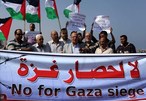
The Palestinian Human Rights Center (PHRC) said that due to the unjust siege imposed on the Gaza Strip by Israel, the poverty rate in Gaza has recently increased to reach 38.8%; out of which 21.1% are suffering from destitution. The unemployment rate has recently increased to reach 44%.
PHRC warned that these rates indicate an unprecedented economic deterioration in the blockaded enclave.
In its weekly report, PHRC pointed out that the Israeli occupation authority (IOA) has imposed sanctions against the civilians in the West Bank as part of the collective punishment policy pursued by the IOA, which flagrantly violates international human laws.
The report also said that the IOA has completely closed three out of four commercial crossings which connect Gaza with the West Bank and Israel.
Karem Abu Salem (Kerem Shalom) crossing is Gaza's only commercial crossing but it is not fit to meet the needed amount of goods and fuel.
PHRC charged that Israel has imposed tight security restrictions on people’s movement via Beit Hanoun (Erez) crossing depriving the Gazans from reaching their families in WB and the 1948-occupied lands, let alone the hundreds of students who were deprived from attending the WB universities.
The IOA is banning the entry of raw materials and construction materials to the Strip except for very few kinds and in very limited quantities to be used in the international projects, according to the report.
It highlighted that there is an almost complete ban on Gaza's exports except for few products like flowers, strawberries, and spices.
PHRC stressed that Gaza and the West Bank including Jerusalem are still under Israeli occupation and that crossings' closure and collective punishment policies are still imposed on the Gazans in absolute disregard to the human rights’ treaties, the international humanitarian law, and Geneva Conventions.
Israel is bound to apply the international human rights law (IHRL) in a way that provides the civilians and victims with better protection, the report said.
Israel has been imposing tight land and sea blockade on Gaza in an attempt to completely isolate the Strip from the external world, which seriously worsened the economic, social, educational and living conditions of about 1.8 million Palestinians.
PHRC warned that these rates indicate an unprecedented economic deterioration in the blockaded enclave.
In its weekly report, PHRC pointed out that the Israeli occupation authority (IOA) has imposed sanctions against the civilians in the West Bank as part of the collective punishment policy pursued by the IOA, which flagrantly violates international human laws.
The report also said that the IOA has completely closed three out of four commercial crossings which connect Gaza with the West Bank and Israel.
Karem Abu Salem (Kerem Shalom) crossing is Gaza's only commercial crossing but it is not fit to meet the needed amount of goods and fuel.
PHRC charged that Israel has imposed tight security restrictions on people’s movement via Beit Hanoun (Erez) crossing depriving the Gazans from reaching their families in WB and the 1948-occupied lands, let alone the hundreds of students who were deprived from attending the WB universities.
The IOA is banning the entry of raw materials and construction materials to the Strip except for very few kinds and in very limited quantities to be used in the international projects, according to the report.
It highlighted that there is an almost complete ban on Gaza's exports except for few products like flowers, strawberries, and spices.
PHRC stressed that Gaza and the West Bank including Jerusalem are still under Israeli occupation and that crossings' closure and collective punishment policies are still imposed on the Gazans in absolute disregard to the human rights’ treaties, the international humanitarian law, and Geneva Conventions.
Israel is bound to apply the international human rights law (IHRL) in a way that provides the civilians and victims with better protection, the report said.
Israel has been imposing tight land and sea blockade on Gaza in an attempt to completely isolate the Strip from the external world, which seriously worsened the economic, social, educational and living conditions of about 1.8 million Palestinians.

Khan Younis municipality in southern Gaza Strip executed, in collaboration with the Ministry of Agriculture, 2500 chickens and ducks infected with bird flu after being discovered in a farm.
The Director of veterinary in Khan Younis Nanis al-Farra said the Ministry of Agriculture executed 2500 birds in addition to 2000 fertilized eggs after medical checkups and procedures that proved the infection.
The implementation of the culling of birds was done in accordance with health conditions followed with the participation of doctors belonging to the Ministry of Agriculture-Veterinary Services, she added.
Farra called on citizens along with the owners of ranch homes to immediately notify the ministry of Agriculture in case of suspicion of any symptoms that emerge on their birds in order to be handled based on health procedures.
The ministry, for its part, intensified its procedures of prevention of Bird flu in order to maintain public health. It closed all the unlicensed hatcheries of chicken and ducks in accordance with the rules followed.
The ministry of Agriculture has culled 50,000 birds in addition to 150,000 eggs since last March.
The Director of veterinary in Khan Younis Nanis al-Farra said the Ministry of Agriculture executed 2500 birds in addition to 2000 fertilized eggs after medical checkups and procedures that proved the infection.
The implementation of the culling of birds was done in accordance with health conditions followed with the participation of doctors belonging to the Ministry of Agriculture-Veterinary Services, she added.
Farra called on citizens along with the owners of ranch homes to immediately notify the ministry of Agriculture in case of suspicion of any symptoms that emerge on their birds in order to be handled based on health procedures.
The ministry, for its part, intensified its procedures of prevention of Bird flu in order to maintain public health. It closed all the unlicensed hatcheries of chicken and ducks in accordance with the rules followed.
The ministry of Agriculture has culled 50,000 birds in addition to 150,000 eggs since last March.
13 aug 2015

The European Union, with the government of Denmark, has announced a donation of $26 million in aid to be transferred to hospitals in occupied East Jerusalem.
The latest contribution is being channeled through PEGASE, a European mechanism launched in 2008 by the European Commission to help build a Palestinian state.
According to Ma'an, the aid will cover part of debts owed to hospitals by patients referred by the Palestinian Authority for medical care during 2014.
The aid comes from both the EU budget ($14 million) and the Government of Denmark ($11 million).
Since 2012, the EU and its member states have donated over $67 million in efforts to relieve the financial burden facing six hospitals in the East Jerusalem Hospitals Network, the statement said.
This amount has been donated to cover the costs of referral of patients for treatment to East Jerusalem Hospitals by the Palestinian Ministry of Health for a period of over three years.
"The six East Jerusalem Hospitals serve as the main center for specialized care within the Palestinian health system. Patients from the West Bank and Gaza are benefiting from the quality health services provided by these hospitals. Preserving their work is therefore essential," EU Representative John Gatt-Rutter said in the statement.
"This latest contribution of almost $26 million comes in the context of on-going reforms designed to improve the fiscal situation of the hospitals."
Palestinians in occupied East Jerusalem have historically struggled to access high quality health care.
Due to a lack a medical specialists inside of the Gaza Strip and West Bank, Palestinians living in the occupied areas are often referred to hospitals in occupied East Jerusalem.
The World Health Organization in 2014 reported that the Israeli permit system poses a massive barrier to healthcare for Palestinians attempting to access care in East Jerusalem health facilities.
The latest contribution is being channeled through PEGASE, a European mechanism launched in 2008 by the European Commission to help build a Palestinian state.
According to Ma'an, the aid will cover part of debts owed to hospitals by patients referred by the Palestinian Authority for medical care during 2014.
The aid comes from both the EU budget ($14 million) and the Government of Denmark ($11 million).
Since 2012, the EU and its member states have donated over $67 million in efforts to relieve the financial burden facing six hospitals in the East Jerusalem Hospitals Network, the statement said.
This amount has been donated to cover the costs of referral of patients for treatment to East Jerusalem Hospitals by the Palestinian Ministry of Health for a period of over three years.
"The six East Jerusalem Hospitals serve as the main center for specialized care within the Palestinian health system. Patients from the West Bank and Gaza are benefiting from the quality health services provided by these hospitals. Preserving their work is therefore essential," EU Representative John Gatt-Rutter said in the statement.
"This latest contribution of almost $26 million comes in the context of on-going reforms designed to improve the fiscal situation of the hospitals."
Palestinians in occupied East Jerusalem have historically struggled to access high quality health care.
Due to a lack a medical specialists inside of the Gaza Strip and West Bank, Palestinians living in the occupied areas are often referred to hospitals in occupied East Jerusalem.
The World Health Organization in 2014 reported that the Israeli permit system poses a massive barrier to healthcare for Palestinians attempting to access care in East Jerusalem health facilities.
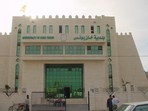
The Coastal Municipalities Water Utility (CMWU) has appealed to Gaza donors to urgently step in and work on assuaging the humanitarian crisis rocking Rafah city and the eastern villages of Khan Younis before it is too late.
CMWU said, in a statement, the water and sanitation services are on the verge of a total breakdown due to the exacerbating electricity crisis in Gaza, itself aggravated by the increasing problems in connecting power from Egypt.
CMWU warned that an outage is very likely to rock water utilities within the next 12 hours and the sanitation facilities within 48 hours.
The department appealed to the donor countries to urgently intervene and work on providing Rafah and the eastern regions of Khan Younis with a minimum of some 6,500 liters of diesel per day so as to provide civilians with the basic water and sanitation facilities and prevent an imminent environmental and humanitarian crisis pending serious work, by the energy authorities, on a more permanent solution.
CMWU said, in a statement, the water and sanitation services are on the verge of a total breakdown due to the exacerbating electricity crisis in Gaza, itself aggravated by the increasing problems in connecting power from Egypt.
CMWU warned that an outage is very likely to rock water utilities within the next 12 hours and the sanitation facilities within 48 hours.
The department appealed to the donor countries to urgently intervene and work on providing Rafah and the eastern regions of Khan Younis with a minimum of some 6,500 liters of diesel per day so as to provide civilians with the basic water and sanitation facilities and prevent an imminent environmental and humanitarian crisis pending serious work, by the energy authorities, on a more permanent solution.

The Israeli occupation forces (IOF) on Wednesday afternoon launched a campaign in search for Palestinian water wells in different areas of Marj Ibn Amer, west of Jenin city.
Local sources reported that employees from the Israeli water authority escorted by soldiers from the military camp of Salem stormed and combed cultivated fields in the area and near the segregation wall to look for water wells.
They added that the soldiers interrogated the farmers on their own lands about the wells in the region, without stating if there were any kind of intended Israeli measures restricting the farmers' use of their wells.
In another incident, the Israeli water company Mekorot, the sole provider of piped water in the Israeli occupied territory and the West Bank, cut water to the cities of Nablus and Qalqiliya with no prior notice.
The Palestinian water authority stated on Wednesday that the Israeli company Mekorot suddenly cut water to all Palestinian communities in the northern West Bank areas, extending from the north of Nablus to Qalqiliya.
The water authority added it had tried to contact Mekorot to know the reason behind the water cut, but still no response from it.
Israel controls all water resources in the West Bank and imposes restrictions on the use of water by the Palestinians in their areas.
Local sources reported that employees from the Israeli water authority escorted by soldiers from the military camp of Salem stormed and combed cultivated fields in the area and near the segregation wall to look for water wells.
They added that the soldiers interrogated the farmers on their own lands about the wells in the region, without stating if there were any kind of intended Israeli measures restricting the farmers' use of their wells.
In another incident, the Israeli water company Mekorot, the sole provider of piped water in the Israeli occupied territory and the West Bank, cut water to the cities of Nablus and Qalqiliya with no prior notice.
The Palestinian water authority stated on Wednesday that the Israeli company Mekorot suddenly cut water to all Palestinian communities in the northern West Bank areas, extending from the north of Nablus to Qalqiliya.
The water authority added it had tried to contact Mekorot to know the reason behind the water cut, but still no response from it.
Israel controls all water resources in the West Bank and imposes restrictions on the use of water by the Palestinians in their areas.
12 aug 2015
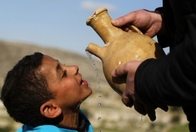
During the hottest month of the year, the Israeli occupation has cut off water from three more Palestinian villages in the occupied West Bank.
The villages of Qarawat Bani Hassan, Biddya and Sarta, in the West Bank cityu of Nablus, have received only a partial supply of water, leaving almost half of their residents without running water on certain days.
Mayor of Qarawat Bani Hassan, Aziz Aasi, said that the Israeli water company "Mekorot" had begun lowering the water quota for the villages, causing water pressure to drop.
“Following the decrease in water pressure, all the houses that are in the higher parts of the towns were left without a drop,” he said, according to Days of Palestine.
Rifat Mari was one of the residents left without water. “I have three children and I need to walk for kilometres to a spring that has a stream of water in order to fill bottles for the kids. We did not have showers for several days.”
The serious shortage, last week, led the village mayors to organise a protest outside the main water pump.
Israeli military troops, police,and Civil Administration officials arrived to try to restore calm and promised residents that the problem would be solved, but that was an attempt to supress protests calling for rein station water supply.
“Why do the Jewish settlers next to us get a quota of 300 litters per person, while we only get 70 litters per person?” asked Biddya Mayor Suleiman Taha. “If they get such an amount of water, then we should get the same amount.”
Meanwhile, the villages are being helped by neighbouring Palestinian villages, which send water tankers every few days, but this is not enough.
“The residents are furious at me,” said Aasi. “They think I have a button next to my bed that turns the village’s water on and off.”
Mekorot recently decided to adjust the water because of increased consumption, causing shortages in only the Palestinian villages, leaving them suffering.
The villages of Qarawat Bani Hassan, Biddya and Sarta, in the West Bank cityu of Nablus, have received only a partial supply of water, leaving almost half of their residents without running water on certain days.
Mayor of Qarawat Bani Hassan, Aziz Aasi, said that the Israeli water company "Mekorot" had begun lowering the water quota for the villages, causing water pressure to drop.
“Following the decrease in water pressure, all the houses that are in the higher parts of the towns were left without a drop,” he said, according to Days of Palestine.
Rifat Mari was one of the residents left without water. “I have three children and I need to walk for kilometres to a spring that has a stream of water in order to fill bottles for the kids. We did not have showers for several days.”
The serious shortage, last week, led the village mayors to organise a protest outside the main water pump.
Israeli military troops, police,and Civil Administration officials arrived to try to restore calm and promised residents that the problem would be solved, but that was an attempt to supress protests calling for rein station water supply.
“Why do the Jewish settlers next to us get a quota of 300 litters per person, while we only get 70 litters per person?” asked Biddya Mayor Suleiman Taha. “If they get such an amount of water, then we should get the same amount.”
Meanwhile, the villages are being helped by neighbouring Palestinian villages, which send water tankers every few days, but this is not enough.
“The residents are furious at me,” said Aasi. “They think I have a button next to my bed that turns the village’s water on and off.”
Mekorot recently decided to adjust the water because of increased consumption, causing shortages in only the Palestinian villages, leaving them suffering.
11 aug 2015
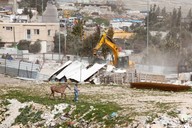
The Israeli army demolished, on Tuesday morning, a commercial building in the Industrial Zone, north of occupied East Jerusalem, after surrounding the entire area.
Several Israeli vehicles, accompanied by army bulldozers, surrounded the area and declared it a closed military zone, before demolishing a building that belongs to resident Mazen Abu Diab, the Wadi Hilweh Information Center has reported.
Part of his building was constructed in 1971, and he added 100 square meters to the building, two years ago.
He added that he filed all needed papers to the Jerusalem City Council since he started modifying his structure, but instead of receiving a license, he was informed the City Council intends to demolish his structure, but never received a demolition order.
The demolished building was a three-story building of 220 square meters, composed of four rooms, in addition to two meeting halls and their facilities.
Abu Diab was conducting final preparations to prepare it for office use.
Several Israeli vehicles, accompanied by army bulldozers, surrounded the area and declared it a closed military zone, before demolishing a building that belongs to resident Mazen Abu Diab, the Wadi Hilweh Information Center has reported.
Part of his building was constructed in 1971, and he added 100 square meters to the building, two years ago.
He added that he filed all needed papers to the Jerusalem City Council since he started modifying his structure, but instead of receiving a license, he was informed the City Council intends to demolish his structure, but never received a demolition order.
The demolished building was a three-story building of 220 square meters, composed of four rooms, in addition to two meeting halls and their facilities.
Abu Diab was conducting final preparations to prepare it for office use.
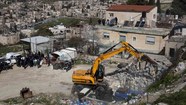
The Israeli Occupation Forces (IOF) stormed overnight Palestinian lands near Jalama crossing, north of Jenin, and demolished commercial stores near the area.
Local sources affirmed that the demolished facilities include a taxi office, a grocery store, and a small coffee shop that were notified with demolition two months ago.
Israeli sources claimed that the demolished facilities constituted a security threat to the crossing that links between Jenin and the 1948 occupied territories.
The demolished facilities provide urgent services to thousands of Palestinian workers, who are daily obliged to pass through Jalama crossing to reach their workplaces.
Local sources affirmed that the demolished facilities include a taxi office, a grocery store, and a small coffee shop that were notified with demolition two months ago.
Israeli sources claimed that the demolished facilities constituted a security threat to the crossing that links between Jenin and the 1948 occupied territories.
The demolished facilities provide urgent services to thousands of Palestinian workers, who are daily obliged to pass through Jalama crossing to reach their workplaces.
10 aug 2015
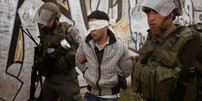
Israeli Occupation Forces (IOF) Monday overnight continued a wide campaign of kidnapping youths and children, in addition to handing out demolition orders.
PNN reoporter said that IOF have demolished a facility used for sheep in Thahriyya village that belongs to a citizen, and handed a citizen a demolition threat to the well he owns in Yatta.
IOF then moved to kidnap a number of youths from the Hebron district, including towns of Halhul, Bani-Nu’aim and Si’ir.
Among the arrested were three children from Si’ir village, aged 14.
The three were taken to the Ofer military court after they received notices to go to the Israeli intelligence on Sunday.
IOF did not give any reasons for the kidnap, and the number of detainees is still unidentified.
PNN reoporter said that IOF have demolished a facility used for sheep in Thahriyya village that belongs to a citizen, and handed a citizen a demolition threat to the well he owns in Yatta.
IOF then moved to kidnap a number of youths from the Hebron district, including towns of Halhul, Bani-Nu’aim and Si’ir.
Among the arrested were three children from Si’ir village, aged 14.
The three were taken to the Ofer military court after they received notices to go to the Israeli intelligence on Sunday.
IOF did not give any reasons for the kidnap, and the number of detainees is still unidentified.
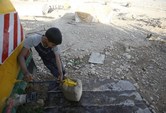
Israeli Occupation Forces (IOF) on Sunday blocked water tanks from reaching Bedouin families in Wadi al-Maleh in the northern Jordan Valley in absolute disregard to the severe hot weather.
Local sources revealed that the IOF soldiers stopped Palestinians’ tractors towing water tanks, blocked their traffic, and prohibited them to access the area.
The sources pointed out that the IOF deliberately pressures Bedouins in the region with the aim of forcing them to leave their homes in Wadi al-Maleh.
The Israeli forces prevent Bedouins from using water springs in the area and consider water transfer via tanks an offense for which drivers get penalized by confiscation and fines. Besides, the confiscated water tanks are usually transferred to Israeli military camps.
Local sources revealed that the IOF soldiers stopped Palestinians’ tractors towing water tanks, blocked their traffic, and prohibited them to access the area.
The sources pointed out that the IOF deliberately pressures Bedouins in the region with the aim of forcing them to leave their homes in Wadi al-Maleh.
The Israeli forces prevent Bedouins from using water springs in the area and consider water transfer via tanks an offense for which drivers get penalized by confiscation and fines. Besides, the confiscated water tanks are usually transferred to Israeli military camps.
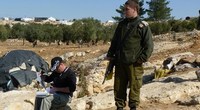
The Israeli occupation army on Sunday issued an order halting work on a water project funded by the European Union (EU) in Yatta town, south of al-Khalil city, and photographed a number of wells and structures in other nearby areas.
Anti-settlement activist Rateb al-Jabour told the Palestinian Information Center (PIC) that Israeli soldiers stormed Khellet al-Mayyeh village, south of Yatta, and handed its municipal chief a halt order against the construction of two EU-funded water tanks.
As usual, the Israeli army justified its measure by claiming that the project was unlicensed.
Jabour also said that soldiers photographed a number of water wells belonging to Palestinian citizens in the western area of Yatta as well as sheds, tents, and other wells in Umm al-Khair village, east of Yatta.
The activist condemned such Israeli measures against the Palestinian villagers in Yatta as aimed at forcing them to leave their native areas for the sake of settlement expansion activities.
Anti-settlement activist Rateb al-Jabour told the Palestinian Information Center (PIC) that Israeli soldiers stormed Khellet al-Mayyeh village, south of Yatta, and handed its municipal chief a halt order against the construction of two EU-funded water tanks.
As usual, the Israeli army justified its measure by claiming that the project was unlicensed.
Jabour also said that soldiers photographed a number of water wells belonging to Palestinian citizens in the western area of Yatta as well as sheds, tents, and other wells in Umm al-Khair village, east of Yatta.
The activist condemned such Israeli measures against the Palestinian villagers in Yatta as aimed at forcing them to leave their native areas for the sake of settlement expansion activities.
8 aug 2015
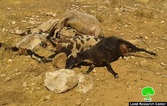
Dead cattle in Kfar Qaddoum
As an exceptionally hot summer heatwave continues to drain the region's water supplies, this week Israeli water company Mekorot took the situation to a new level with the villagers of Kafr Qaddoum when the company cut off the village's water supply.
The village is almost entirely dependent on agriculture, and the cutoff of water left hundreds of animals without water. The human population of the village numbers around 4,000, and only those who had water tanks or stored water bottles were able to have anything to drink during the Israeli water cutoff.
The animals which died include a number of cattle, and hundreds of chickens and other domestic birds.
According to the head of the village council of Kafr Qaddoum, located in the northern West Bank near Nablus, the Israeli company cut off the village's water with no warning or reason.
Hamzeh Jomaa, the village council head, said that he has been trying to contact Mekorot to find out why the water was cut and when it will return.
In the meantime, the farm-dependent village is likely to continue to lose livestock and crops as the excessive heat continues.
Mekorot pumps water from underground reservoirs on Palestinian-owned land, essentially stealing water from Palestinians and then selling it back to them at high prices.
The amount of water allocated to Israelis is nearly four times the amount provided to Palestinian residents. Just 70 liters a day is provided to Palestinians, even during heat waves such as the current one, and this is less than the 100 liters a day recommended as a minimum by the World Health Organization.
And the allocation also does not include agricultural uses, despite the fact that the majority of Palestinians are dependent on agriculture for survival.
As an exceptionally hot summer heatwave continues to drain the region's water supplies, this week Israeli water company Mekorot took the situation to a new level with the villagers of Kafr Qaddoum when the company cut off the village's water supply.
The village is almost entirely dependent on agriculture, and the cutoff of water left hundreds of animals without water. The human population of the village numbers around 4,000, and only those who had water tanks or stored water bottles were able to have anything to drink during the Israeli water cutoff.
The animals which died include a number of cattle, and hundreds of chickens and other domestic birds.
According to the head of the village council of Kafr Qaddoum, located in the northern West Bank near Nablus, the Israeli company cut off the village's water with no warning or reason.
Hamzeh Jomaa, the village council head, said that he has been trying to contact Mekorot to find out why the water was cut and when it will return.
In the meantime, the farm-dependent village is likely to continue to lose livestock and crops as the excessive heat continues.
Mekorot pumps water from underground reservoirs on Palestinian-owned land, essentially stealing water from Palestinians and then selling it back to them at high prices.
The amount of water allocated to Israelis is nearly four times the amount provided to Palestinian residents. Just 70 liters a day is provided to Palestinians, even during heat waves such as the current one, and this is less than the 100 liters a day recommended as a minimum by the World Health Organization.
And the allocation also does not include agricultural uses, despite the fact that the majority of Palestinians are dependent on agriculture for survival.
7 aug 2015
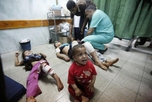
A number of hospitals in Gaza Strip may be forced to close, due to lack of funding and an ongoing humanitarian crisis, an official warned on Thursday.
Deputy Palestinian Minister of Health, Dr. Yousef abul-Rish, said that the situation in the medical centres and hospitals has become “catastrophic”, and that basic services are in danger of being stopped.
According to Days of Palestine, he blamed the national unity government, explaining that it had “given up its responsibilities towards the Gaza Strip", mainly in the healthcare sector.
“The ministry in Gaza is deprived of the running and administrative expenses needed to cover all its daily needs,” said Abul-Rish. “The problems are aggravating day after day,” he added.
The biggest problem, he said, is that the employees have not received salaries for the second consecutive year.
Abul-Rish condemned the persistence of the Ramallah-based government in restricting the entrance of medicines and medical staff to the Strip, warning that many basic medicines have already run out.
Deputy Palestinian Minister of Health, Dr. Yousef abul-Rish, said that the situation in the medical centres and hospitals has become “catastrophic”, and that basic services are in danger of being stopped.
According to Days of Palestine, he blamed the national unity government, explaining that it had “given up its responsibilities towards the Gaza Strip", mainly in the healthcare sector.
“The ministry in Gaza is deprived of the running and administrative expenses needed to cover all its daily needs,” said Abul-Rish. “The problems are aggravating day after day,” he added.
The biggest problem, he said, is that the employees have not received salaries for the second consecutive year.
Abul-Rish condemned the persistence of the Ramallah-based government in restricting the entrance of medicines and medical staff to the Strip, warning that many basic medicines have already run out.
6 aug 2015
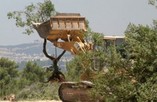
Israeli forces, on Thursday, demolished a tire repair shop and another structure in Bethlehem district, said two local activists.
Taha Hamamra, a local activist, told WAFA correspondence that Israeli forces demolished a tire repair shop at the western entrance of Husan village to the west of the city purportedly for being built without an Israeli building permit.
The Palestinian owner of the shop was identified as Bajes Shusha.
This was the second time Israeli forces demolished a property for Shusha. Almost a year ago, a flower shop belonging to Shusha was demolished.
Moreover, forces demolished a structure belonging to a Palestinian in the area opposite to the tunnel checkpoint between Beit Jala and Jerusalem. The Palestinian owner was identified as Tareq al-Walaji.
Israel rarely grants construction permits to Palestinians in the West Bank, including East Jerusalem, and regularly demolishes structures built without permits, forcing Palestinians to embark on construction without permit to shelter and provide their families with livelihoods.
Having no other choice, many Palestinians in Area C of the West Bank, under complete Israeli control, are forced to build without permits to be able to provide a shelter for their families, risking in the process having their buildings demolished.
Humanitarian and legal bodies and institutions such as the United Nations, the UN Office for the Coordination of Humanitarian Affairs (OCHA) and B’Tselem confirm that the planning policies applied by Israel in Area C and East Jerusalem discriminate against Palestinians, making it extremely difficult for them to obtain building permits.
“As a result, many Palestinians build without permits to meet their housing needs and risk having their structures demolished. Palestinians must have the opportunity to participate in a fair and equitable planning system that ensures their needs are met,” OCHA reports.
Data from OCHA’s Protection of Civilians weekly report, covering a two week period starting from 14 July 2015, indicate that Israel demolished 10 Palestinian-owned structures in the West Bank during this period, displacing 16 Palestinians.
Data also reveal that demolition has been taking place at a weekly average of 17 structures in the West Bank Area C and three structures in East Jerusalem, displacing 19 Palestinians from Area C and two Palestinians from East Jerusalem.
Taha Hamamra, a local activist, told WAFA correspondence that Israeli forces demolished a tire repair shop at the western entrance of Husan village to the west of the city purportedly for being built without an Israeli building permit.
The Palestinian owner of the shop was identified as Bajes Shusha.
This was the second time Israeli forces demolished a property for Shusha. Almost a year ago, a flower shop belonging to Shusha was demolished.
Moreover, forces demolished a structure belonging to a Palestinian in the area opposite to the tunnel checkpoint between Beit Jala and Jerusalem. The Palestinian owner was identified as Tareq al-Walaji.
Israel rarely grants construction permits to Palestinians in the West Bank, including East Jerusalem, and regularly demolishes structures built without permits, forcing Palestinians to embark on construction without permit to shelter and provide their families with livelihoods.
Having no other choice, many Palestinians in Area C of the West Bank, under complete Israeli control, are forced to build without permits to be able to provide a shelter for their families, risking in the process having their buildings demolished.
Humanitarian and legal bodies and institutions such as the United Nations, the UN Office for the Coordination of Humanitarian Affairs (OCHA) and B’Tselem confirm that the planning policies applied by Israel in Area C and East Jerusalem discriminate against Palestinians, making it extremely difficult for them to obtain building permits.
“As a result, many Palestinians build without permits to meet their housing needs and risk having their structures demolished. Palestinians must have the opportunity to participate in a fair and equitable planning system that ensures their needs are met,” OCHA reports.
Data from OCHA’s Protection of Civilians weekly report, covering a two week period starting from 14 July 2015, indicate that Israel demolished 10 Palestinian-owned structures in the West Bank during this period, displacing 16 Palestinians.
Data also reveal that demolition has been taking place at a weekly average of 17 structures in the West Bank Area C and three structures in East Jerusalem, displacing 19 Palestinians from Area C and two Palestinians from East Jerusalem.
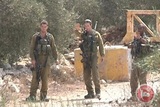
Dozens of Palestinian residents of the occupied West Bank village of Kafr Qaddum staged a sit-in, on Wednesday, to protest the Israeli national water company's cutting off its supply to the village, locals said.
Hamzeh Jumaa, the head of the village council, told Ma'an News Agency that the Israeli water company Mekorot cut off its supply, Sunday.
He said that the water supplies some 4,000 people living in Kafr Qaddum in Qalqilia, which he highlighted was an agricultural village.
He said that thousands of poultry birds have died due to a lack of water combined with extreme temperatures. Jumaa said that they have not received any answer from Mekerot as to why the water was cut off or when it will be brought back.
The council head added that Mekerot provides water to all Palestinian villages and illegal Israeli settlements in the surrounding area.
Israelis, including settlers, have access to 300 liters of water per day, according to EWASH, while the West Bank average is around 70 liters, below the World Health Organization's recommended minimum of 100 liters per day for basic sanitation, hygiene and drinking.
Kafr Qaddum has lost large swathes of its land to Israeli settlements, outposts and the apartheid wall, all illegal under international law.
According to the Applied Research Institute of Jerusalem, more than 10 percent of the village's land has been confiscated for the establishment of the settlements alone -- Kedumim, Kedumim Zefon, Jit, and Givat HaMerkaziz.
Residents of Kafr Qaddum stage regular protests, including a weekly Friday march, to protest land confiscations as well as the closure of the village's southern road by Israeli forces.
The road, which has been closed 13 years, is the main route to the nearby city of Nablus, the nearest economic center.
Israeli forces regularly use violent means to suppress the protests.
IMEMC archive story: Thousands of Palestinians in Jerusalem Without Water
Hamzeh Jumaa, the head of the village council, told Ma'an News Agency that the Israeli water company Mekorot cut off its supply, Sunday.
He said that the water supplies some 4,000 people living in Kafr Qaddum in Qalqilia, which he highlighted was an agricultural village.
He said that thousands of poultry birds have died due to a lack of water combined with extreme temperatures. Jumaa said that they have not received any answer from Mekerot as to why the water was cut off or when it will be brought back.
The council head added that Mekerot provides water to all Palestinian villages and illegal Israeli settlements in the surrounding area.
Israelis, including settlers, have access to 300 liters of water per day, according to EWASH, while the West Bank average is around 70 liters, below the World Health Organization's recommended minimum of 100 liters per day for basic sanitation, hygiene and drinking.
Kafr Qaddum has lost large swathes of its land to Israeli settlements, outposts and the apartheid wall, all illegal under international law.
According to the Applied Research Institute of Jerusalem, more than 10 percent of the village's land has been confiscated for the establishment of the settlements alone -- Kedumim, Kedumim Zefon, Jit, and Givat HaMerkaziz.
Residents of Kafr Qaddum stage regular protests, including a weekly Friday march, to protest land confiscations as well as the closure of the village's southern road by Israeli forces.
The road, which has been closed 13 years, is the main route to the nearby city of Nablus, the nearest economic center.
Israeli forces regularly use violent means to suppress the protests.
IMEMC archive story: Thousands of Palestinians in Jerusalem Without Water
